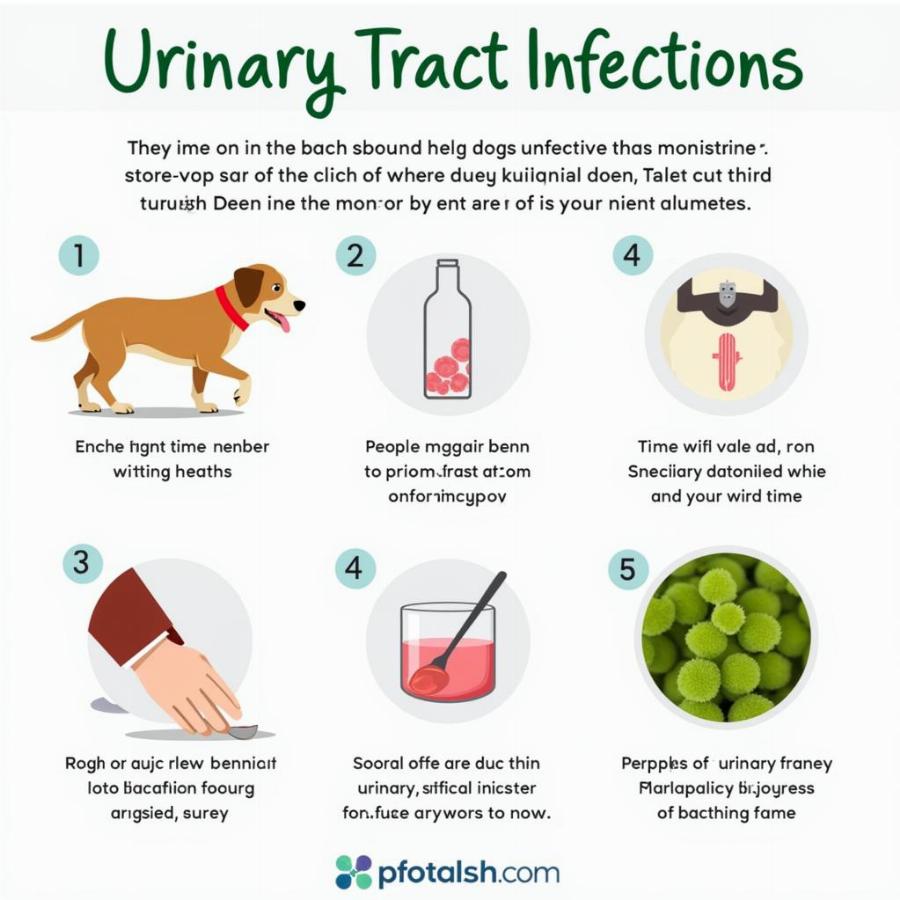Dog bad smelling urine can be a concerning sign for pet owners. While some variation in odor is normal, a strong or unusual smell can indicate an underlying health issue or dietary problem in your canine companion. Understanding the causes of dog bad smelling urine is crucial for addressing the problem effectively and ensuring your furry friend’s well-being.
Understanding Why Your Dog’s Urine Smells Bad
Several factors can contribute to dog bad smelling urine, ranging from simple dehydration to more serious infections. A change in diet, certain medications, and even the dog’s age can influence the odor of their urine. If you notice your dog’s urine smells particularly strong, pungent, or like ammonia, it’s important to investigate the cause.
Dehydration: A Common Culprit
One of the most common reasons for dog bad smelling urine is dehydration. When a dog isn’t drinking enough water, their urine becomes more concentrated, leading to a stronger, more pungent ammonia-like smell. Ensuring your dog has access to fresh, clean water at all times is essential.
Urinary Tract Infections (UTIs)
UTIs are a frequent cause of dog bad smelling urine, especially if the smell is accompanied by other symptoms like frequent urination, straining to urinate, or blood in the urine. Bacteria in the urinary tract can cause a foul odor. If you suspect a UTI, a visit to the veterinarian is necessary for diagnosis and treatment.
Bladder Stones
Bladder stones can also lead to dog bad smelling urine and may cause discomfort or pain during urination. These stones can irritate the bladder lining and create a breeding ground for bacteria, resulting in a strong urine odor.
 Viêm đường tiết niệu ở chó
Viêm đường tiết niệu ở chó
Medical Conditions like Diabetes and Kidney Disease
Certain medical conditions, such as diabetes and kidney disease, can also affect urine odor. Dogs with diabetes often have sweet-smelling urine, while kidney disease can result in a more pungent, ammonia-like odor. These conditions require veterinary attention and ongoing management.
Dietary Influences
What your dog eats can impact the smell of their urine. Certain foods, especially those high in protein, can lead to a stronger smell. Switching to a different dog food might help if you suspect diet is the culprit. However, it’s essential to consult your veterinarian before making significant dietary changes.
How to Address Dog Bad Smelling Urine
Addressing dog bad smelling urine effectively depends on identifying the underlying cause. While increasing water intake can help with dehydration, other causes require veterinary intervention.
When to See a Vet
If your dog’s urine smell changes suddenly or is accompanied by other symptoms like increased thirst, frequent urination, lethargy, or blood in the urine, it’s crucial to seek veterinary care immediately. Early diagnosis and treatment are essential for managing underlying health conditions and preventing complications.
Conclusion
Dog bad smelling urine shouldn’t be ignored. It can be a sign of a simple issue like dehydration or a more serious underlying health problem. By paying attention to your dog’s urine and seeking veterinary care when necessary, you can ensure your furry friend stays healthy and happy. Remember, early detection is key to effective treatment.
FAQ
- Is it normal for dog urine to have a slight odor? Yes, a slight odor is normal. However, a strong, pungent, or unusual smell warrants investigation.
- How can I encourage my dog to drink more water? Try adding flavor to their water, using a pet fountain, or offering water-rich foods like watermelon.
- Can changing my dog’s diet affect their urine odor? Yes, certain foods can impact urine odor. Consult your vet before making dietary changes.
- What are the signs of a UTI in dogs? Frequent urination, straining to urinate, blood in the urine, and a strong urine odor are common UTI symptoms.
- What should I do if my dog’s urine suddenly smells different? Consult your veterinarian immediately for diagnosis and treatment.
- Can stress cause changes in dog urine odor? While stress itself doesn’t directly cause changes in urine odor, it can contribute to behaviors that might, like marking territory more frequently.
- How often should I clean areas where my dog urinates? Regular cleaning with an enzyme-based cleaner is crucial to eliminate odors and discourage repeat accidents.
Do you have other questions about dog health? Check out these articles:
Beaut Dogs: Your Trusted Source for Canine Care
Beaut Dogs is your go-to resource for all things dog-related. We offer expert advice, helpful guides, and product recommendations to help you provide the best possible care for your canine companion. For personalized support and detailed answers to your dog care questions, contact us at [email protected] (Email address). We’re here to help you navigate the wonderful world of dog ownership.